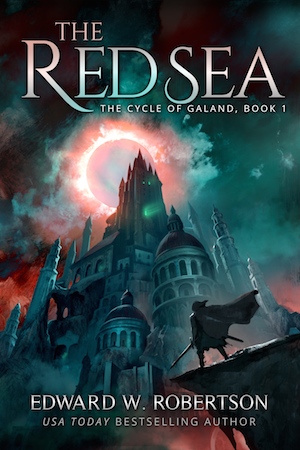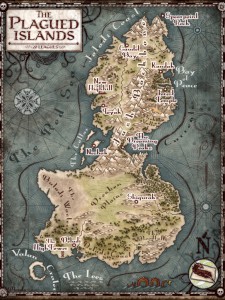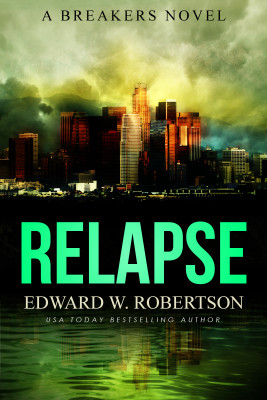I’m going to make a longer post later about this book when I have a little more time, but I’m currently trying to launch it high while getting Galand #7 in on deadline, so I’m going to have to be brief right now. Forgive!
But I’ve got a new book out. It’s a new epic fantasy novel, in a brand new universe, unrelated to anything else I’ve done. And I need you to know about it right now.
It’s cool as hell. And it’s out simultaneously on ebook and audio. And the audio is narrated by… Michael Kramer.
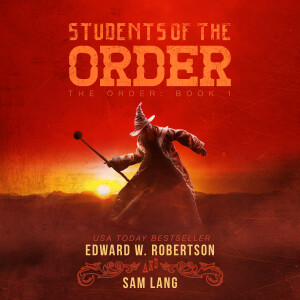 I hate begging, I think the work just speaks for itself or it doesn’t, and that’s been the case for my books for the better part of a decade now. But. I really want this book to get off to a great start. Because great starts are vitally important to the series itself, and thus my ability to continue writing as hard as I try to.
I hate begging, I think the work just speaks for itself or it doesn’t, and that’s been the case for my books for the better part of a decade now. But. I really want this book to get off to a great start. Because great starts are vitally important to the series itself, and thus my ability to continue writing as hard as I try to.
So. If you like my work. If you’ve been reading me for a while. Go pick this one up, too. Get it off to the races. There is a lot to like in this book. It’s both a little more traditional fantasy and a little more not—we’ve got dragons and dwarves, but we also have orcish rifles and mechanical dragons—this is definitely pure epic fantasy, but with some Western influence as well. It’s something you’ve read before, but it’s also nothing like anything you’ve ever read before.
It’s really fun, in other words. I think we could all use some of that right now. So go smash that “BUY” button, and let’s get this thing soaring. We’ll be back to our regularly scheduled series shortly.
I am excited, stoked, and chuffed to announce that Dante and Blays are back in the saddle! THE WOUND OF THE WORLD: The Cycle of Galand #3 is now live. You can find it on Amazon and Amazon UK.
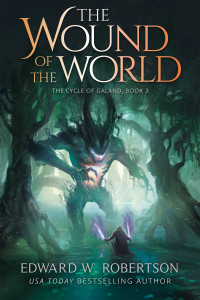 If you’re not a Kindle user, the Kindle app should work on most devices. If you can’t or won’t use Amazon, please email me at edwrobertson AT gmail and we’ll work something out. If you’re a paperback reader, I hope to have that version out within a week or two.
If you’re not a Kindle user, the Kindle app should work on most devices. If you can’t or won’t use Amazon, please email me at edwrobertson AT gmail and we’ll work something out. If you’re a paperback reader, I hope to have that version out within a week or two.
By the way, I get the impression a lot of people think this series will be a trilogy. Well how does it feel to be WRONG? Does it feel great? It should, because this series will actually be five or six books long. My intent is to start writing #4 by December (I have something else to wrap up first) and publish it by April 2017.
When will the audiobook for THE WOUND OF THE WORLD come out, you ask? Well, I’ve just sent the manuscript off to Podium, the audiobook publisher for this series. Tim Gerard Reynolds is slated to record it next month. After that, it’ll take some time for post-production, and a couple-three weeks to be submitted to and approved by Audible.
This is a long-winded way of saying it won’t be overnight. That said, it should be out early next year, perhaps even January. I know Podium will be eager to get rollin’ with it. Speaking of all these things! The Voice Arts Awards have nominated Tim and THE RED SEA for 2016 Best Narrator in a Fantasy novel. Winners will be announced November 13. *glares at VAAs* I’m sure the VAAs will make the correct decision.
Getting back to THE WOUND OF THE WORLD, I always feel a certain amount of trepidation publishing a new book—what if I’ve suddenly turned into a pumpkin and can’t be trusted to write a manual for a coffee machine, let alone a worthy sequel to my previous books??—but I am, at the moment, feeling pretty good about this one. It expands the world while leading to a story that I think will be pretty epic.
Enough blathering by me, either you’re going to buy it or you’re not. My recommendation: get it.
Why have I been so quiet lately? Well, there’s two possibilities on that front. Either the publishing industry has gone back to normal, becoming too static and boring to write about. Or.. I’ve been spending every spare second writing this 215,000-word monster:
 |
| Not pictured: the 215,000 words inside |
The Black Star is the third and final entry in the Cycle of Arawn, my epic fantasy series. Right now, the first book (The White Tree) is free, the second book (The Great Rift) is cut to $0.99, and The Black Star is $2.99, meaning you can buy ~1600 pages of fantasy for less than it would cost you to purchase $4.00 of alternate goods and services. You can get The Black Star at all reputable online bookstores:
This is the first series I’ve ever finished, and it feels pretty good. Not just because these books are wayyy long and I was stressed for months about how long it would take me to finish this one. But also because, when I wrote the first book in the series, I couldn’t get an agent for it. So.. that was it. There never would be a series.
I wrote that book in 2007, spent the rest of the year revising it (and multiple times afterwards, too), and spent 2008 trying to find representation for it. In those bygone days of yore, there was no Kindle, no self-publishing as we know it today; self-publishing was still that thing you only did if you couldn’t sell anything to New York and you wanted to use your garage for storing 5000 copies of your book instead of one copy of your car. (Note: I’m being facetious. I think it’s safe to say that was the perception of self-publishers, but after spending the last two years glimpsing what they went through, I’ve got a lot of retroactive respect for the old schoolers.)
Anyway, point is, I always knew how the rest of the series would play out. But due to the realities of the industry, I was never going to get a chance to write it. Not unless—and this is how delusional I was—I became a big name with different books, then forced(?!) my publisher to publish this other, older series no one wanted in the first place.
Uh.. not going to happen, haha. Which stunk. Because I really liked The White Tree. It was the third book I’d written to that point, but it felt like the first one that might be any good.
Don’t get me wrong, it has flaws. Plenty. The structure of its suspense, for one, is less than perfect. In fact, if for some reason you’re possessed to read my books in the order they were written, you can see that structure evolve from The White Tree (third book written) to Titans (fourth) to Breakers (fifth). I think a similar evolution is evident in the sentences, too. For the record, I don’t think my recent books are unassailable works of genius, nor that The White Tree is garbage; I wouldn’t have it available unto the world if I didn’t believe in it. I do. And sometimes, the rawness of a book is part of its appeal.
But in hindsight, I can see why it attracted neither an agent nor a publisher. Even if it’s a fine book, it’s rough in many ways, and getting a foot in the door of traditional publishing is so competitive that you need a book to be as close to perfect as possible. I used to keep track of agent acceptance rates—see, I was a numbers guy even before going all self-pubby—and for all the manuscripts submitted to them in a given year, the typical agent would accept somewhere between 1 in 1000 and 1 in 10,000.
The numbers aren’t quite as dire as that sounds, because of course there is more than one literary agent out there. Even so, it seemed like (very roughly) 1 in 100 novels from unpublished authors wound up being represented and published.
Here is one of the major truths self-publishing has exposed: you don’t need to be in that 1% to connect with readers. A book doesn’t have to be PERFECT. It just has to be.. well, I don’t know. Very good? Good? Good enough? Competent? I have no idea where the Line of Acceptability is drawn. If you had 100 prospective novels in front of you, I don’t know whether the cutoff is generous (whether 33 or 50 or 67 of those 100 “makes it” as readable) or miserly (3 or 5 or 10). I do know that number is more than 1. Possibly by a lot.
Anyway, to return to my long-lost point, The White Tree wasn’t that 1 in 100, and that made me sad. Over the course of writing it, I really fell for the two main characters, Dante and Blays. And Dante’s discovery of magic, and his pursuit of it as a calling, was inspired by all the things I felt about writing. The sense of purpose it gave me. The dedication I’ve found for it. How fun it is. It may have been about swords and gods crazy shadow-weapons, but at its core, it was a very personal book to write.
Without self-publishing, it would have been lost forever.
The second and third books—which I feel much more confident about; to date, I think The Great Rift is my best book, for what that’s worth—would never have been written. The story would never have been told. Now, it’s finished.
Probably, the world would have found a way to exist without the complete Cycle of Arawn. For me, though? It’s a pretty big deal. Without question, the biggest advantage of self-publishing is the financial side; due to the ebook boom, thousands of writers new and old are now making a living off their fiction.
But it isn’t all about the money. The creative side of it is pretty dang rewarding, too. Thanks for reading.
Psst. Hey. You like epic fantasy? How about lots of epic fantasy novels from some bestselling authors (and me) bundled for a ridiculously cheap price? Then this may be relevant to your interests: the four-book fantasy box set The Strife of Gods & Kings, currently just $0.99.
If we’ve stumbled into a Bizarro Universe where you know me, but not the other authors in the set, here’s a quick rundown. David Dalglish, author of the Half-Orcs series, is perhaps the poster boy for indie epic fantasy. He’s sold hundreds of thousands of copies by himself, and within the next year, he’ll have books coming out with both Orbit and Amazon’s 47 North.
Michael Wallace also began indie, but his Righteous thrillers boomed so big he was quickly snatched up by Amazon’s mystery imprint Thomas & Mercer, where he has sold an absurd amount of books. In addition to his thrillers, he’s written a few fantasy novels. I’m hoping some day he’ll cross back over to the Dark Side for good.
Lastly, I’m me. Hi. My book The White Tree is in here. You might like it.
I’ve read both dudes’ work. It’s great stuff and I’m honored to be in this set with them. Hope you like it.
The New York Times‘ review of HBO’s A Game of Thrones has stirred up a minor geeky shitstorm over Ginia Bellafante’s statements, among them the ironically patronizing claim that it’s “boy fiction patronizingly turned out to reach the population’s other half.” She believes, apparently, that women have little to no interest in Tolkienish epic fantasy, and that HBO amped up the sex in A Game of Thrones just to draw in the ladies.
This is pretty dumb, of course, or simply ignorant. A nice refutation can be found on Geek with Curves. The main point is this: tons of women read fantasy in all forms. If you still picture fantasy as a fandom of sweaty male shut-ins, your stereotypes are at least a generation behind the fact.
Frustratingly, I think Bellafante does reach some highly relevant conclusions about A Game of Thrones itself, criticizing it for “serv[ing] up a lot of confusion in the name of no larger or really relevant idea beyond sketchily fleshed-out notions that war is ugly, families are insidious and power is hot.”
My god! It sounds as if HBO’s version is actually an incredibly faithful adaptation of George R.R. Martin’s well-written but manipulative and mentally bankrupt book series! A series I threw down in disgust midway through the fourth novel when I just couldn’t take it anymore.
The fact I’d read to the fourth novel proves Martin’s series is highly readable and initially engaging. But after a while, I started to get impatient for the long, long, looooong setups to pay off (give me the fucking ice-monsters already!); for his enraging habit of ending every chapter on a cliffhanger and then, when we return to the cliffhung character 50-80 pages later, we’ve found all the action has already passed; for his Saharan lack of ideas besides “people with power should be good, but they usually aren’t”; for the utter inability for the good guys to come out with a single victory (I like grit as much as the next guy, but throw me some hope now and then); for his creepy sex scenes of old men and teenage girls; for his ever-expanding roster of side characters that draw us further and further from the reasons we were reading in the first place…
So for Bellafante to nail down one of the most valid criticisms of A Song of Ice and Fire, only to have her observation lost beneath her hilariously bygone stereotypes? Man, that’s frustrating. For all it insults women, it manages to insult another subset of fantasy fans: those of us who should be inclined to love Martin’s work, but instead find it manipulative, foolish, and overrated.
The other day I was sitting around watching The Fellowship of the Ring, as I do every Monday, Tuesday, and Thursday, when I mentioned to my roommate that, last time I read the books, it sounded like Arwen was the daughter of Elrond and Galadriel.
Needless to say, this was pretty confusing, and I wasn’t at all convinced my interpretation was right; obviously Galadriel and Celeborn are the hot ticket these days, but when you live for thousands of years, is monogamy even less cool than it is for a mortal lifespan? Is cheating even a thing, or is it more like,
Celeborn: Hey, I just realized I haven’t seen another chick naked in 500 years. Mind if I hit the taverns tonight?
Galadriel: Go ahead, sweetie! Oh, you remember that guy Elrond Half-Elven? My old college roommate? Well, we had an affair like 4,800 years ago. Sorry. We were all kind of wound up about Melkor at the time. You know how that goes.
Celeborn: Well, it’s over now, right?
Galadriel: Oh yeah. No, I haven’t even talked to him this Age.
Celeborn: Okay. Well, off to sow me some wild oats!
Galadriel: Have fun! Let me know if you’re going to be later than next spring!
More importantly, how come every elf on Middle Earth doesn’t have scores of children? Even if you only pop out one kid every ten years, some of these guys should have racked up two-three hundred kids by now. Yet Elrond, who’s so old he can remember Isildur’s original betrayal, only seems to have three kids: Arwen, and his twin sons.
That’s some serious fucking birth control. No wonder Galadriel doesn’t give a shit about the Ring when she’s walking around with the One IUD to Rule Them All. Or, as my roommate put it, are elves “so beautiful, yet so impotent”?
Indeed, there’s four possible conclusions we can draw here: a) Elves just don’t bone that often–no more than a couple times a decade; b) Elves get it on as much as humans or dwarves or anyone else, but they have some kind of ultra-effective birth control, be it sheepskin condoms or some inborn ability to choose when to get pregnant; c) They screw like anyone else, they don’t have birth control, but they’re just shooting blanks 99% of the time, or d) They’re only fertile through the first phase of their lives–say, the first 50-200 years–at which point they hit elf menopause, and just sort of putter around the woods for the next 10,000 years or whenever accident strikes them down.
Of these, a) just doesn’t seem likely. c) makes a certain amount of sense–if elves were descended from a line of particularly long-lived apes, rampant infertility would ensure the herd isn’t constantly starving from overpopulation–but if you’ve got 500-1,000 years between generations, it’s going to take a while for that trait to develop, and besides, once the culture developed enough to where they got better at gathering food and the other resources of life, you’d think faster-breeding genetic lines would start to reemerge.
d) is a little better. It ensures any given elf can pass on his or her DNA before settling down into their Golden Eons. However, if I were to dig into the recorded elf family trees, I expect I’d find the children of a single pairing would be born too far apart to be explained by Elf Menopause.
This leaves us with c). In other words, A Wizard Did It. Not a particularly elegant solution, but hey, elves are pretty in touch with nature, and besides, I seem to recall elves were created by some ultra-god back in the good old days, and he seems pretty on the ball.
Still, this conclusion leaves something to be desired. Though it’ll be a sacrifice, I’m going to have to do some field research before coming down on one side or the other. Word up, Arwen. It’s in the name of science.
